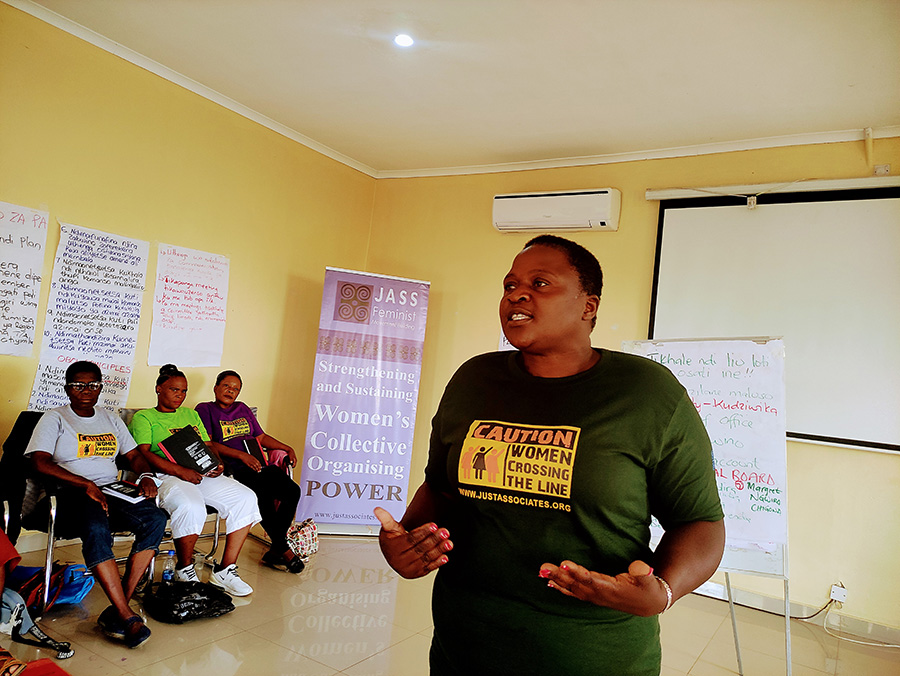
OBOL MOVEMENT EMPOWERS WOMEN LIVING WITH HIV AND AIDS IN COMMUNITIES
Published on March 25, 2024 at 11:01 AM by Alice Mazinga
Our Bodies, Our lives (OBOL) movement with the support from Just Power (JASS) empowers women living with HIV and AIDS by offering business opportunities, encourage them to put their voices together, sharing experiences, identifying common challenges and develop collective solutions
OBOL is a movement that mobilizes communities in the fight for equitable healthcare and economic security for women living with HIV and AIDS.
Tionge Gondwe is a prominent woman of our Bodies, Our Lives Movement (OBOL). Her journey began almost 16 years ago, there from the start, she recalls when she connected with JASS,
“When we started mobilizing and organizing women and girls in our area, people were saying that it will not work because it has never happened in their life and that when women are together they usually fight, this pained me and made me feel powerless but after participating in the Feminist movement building processes organised by OBOL through JASS, I started feeling powerful. I built my power within to challenge this stereotype of undermining women and built power with OBOL members to work hard and build strong movement by sharing skills, knowledge, experiences and capacity”, she explained.
In 2007, even with the substantial increase in funding for HIV/AIDS related initiatives in Malawi to combat the AIDS pandemic, HIV infection rates continued to rise. Although awareness of the impact on women especially poor, black women grew, their voices and leadership were missing from public discussions. There was a notable absence of women-led Agenda or organised movement by HIV positive women.
In response, OBOL movement through JASS started organizing safe spaces for women to delve into the pandemic’s effects on their lives share experiences, identify common challenges, and develop collective solutions.
Tionge and other women in her community observed changes in their bodies resulting from the widely used anti-retroviral treatment at the time, called D4T. she noticed some of the side effects in her body such as, shrunken buttocks, loss of fat in the face, arms and legs. These deformities caused stigma and shame and affected women’s sense of beauty, fertility and sexuality.
Tionge began to realise that her body matters and that by activating the power within and building solidarity with other women, they can change their situation.
“it was OBOL movement, who came in and asked us what was burning in our hearts and then we started addressing the issue of deformation from ARV’S. OBOL taught us how to put our voices together for collective action in order to name and shame the government as well as to lobby for better quality ARVS. We wanted our dignity back”, tionge said.
Tionge’s activism did not just stop with her own situation, she decided that she wanted to fight with other women in her community to make even bigger positive changes.
“I believe in collective power. When you use collective power effectively, it enables you to engage with duty bearers and you don’t fear. It empowers you when you are talking and you feel that there is nothing that can hinder you”, she said
OBOL movement regional coordinator Dorothy Ntuwana said, OBOL campaign for better ARVS was launched in 2012.
Since then, our sustained movement building support and accompaniment have positioned HIV positive women in the leadership for transformative health solutions for all. OBOL upended stigma and exclusion from economic and political participation due to HIV status, replaced outdated and harmful medicines, educated health care providers and traditional leaders about HIV and Sex, found common cause with religious leaders, and built a network of 30 activist hubs in every district of Malawi.
“women from OBOL are now unstoppable force, embodying an alternative vision, narrative and politics to address the structural drivers of exclusion, economic pre-carity and discrimination. Through their organizing hubs, they ensure the continued implementation of health gains while mobilizing new rounds of political action and advocacy for basic needs and access to land”, said Ntuwana.
Ntuwana pointed out that, in past three years, OBOL women have successfully established 74 cooperative food gardens in 30 hubs and counting. These gardens feed their families and lay the foundation for further organizing around alternative economic strategies for secure livelihoods, better nutrition and improved health.
For Tionge, there is still more to be done. She concludes. “my message for other women who are crossing the line is that don’t relax, keep on creating safe environment and fight injustices together, leave no one behind, nothing for us without us, lets raise our voices”.


